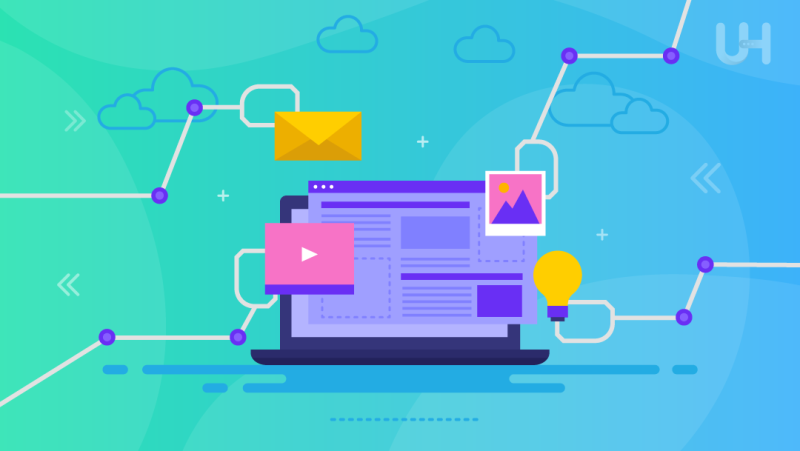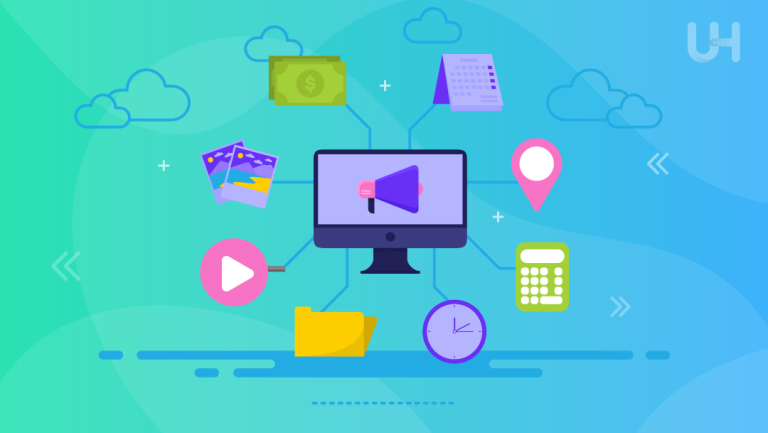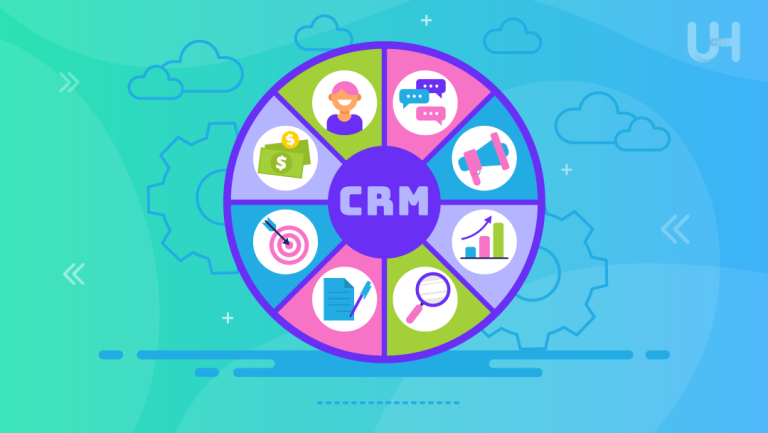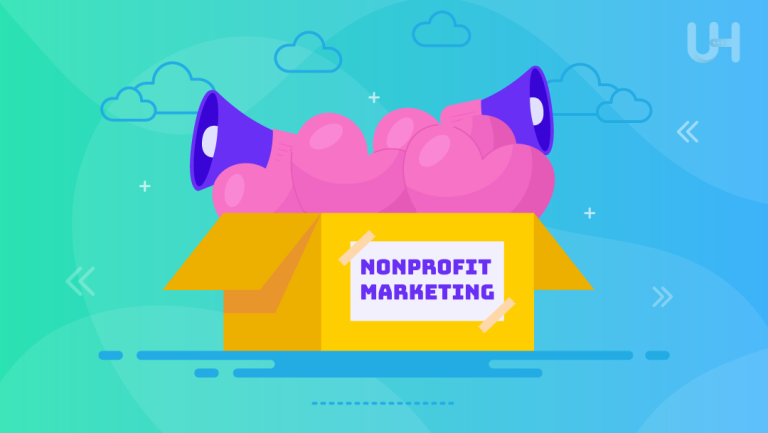Marketing automation refers to the use of software to streamline marketing tasks and workflows. It enables businesses to automate repetitive processes, such as email campaigns and social media posting. This software helps teams manage campaigns more efficiently. By automating these tasks, companies save time and reduce human error. Ultimately, marketing automation enhances overall productivity and allows marketers to focus on strategy and creativity.
Digital marketing has been a bit complex because of the nature of channels and strategies in place. Brands are facing challenges in reaching out to consumers across platforms. Complexity creates the demand for marketing automation that is required for campaign management. Marketing automation saves time, as repetitive tasks are being taken care of, therefore, more focus from marketers can be achieved for strategic efforts.
What is Marketing Automation?
Marketing automation is a type of software that automatically manages marketing tasks or workflows. Its core values include efficiency and customer engagement as it saves time on repetitive tasks and avoids frequent errors. Marketing automation is also known to integrate different channels. These include email, social media, and CRM systems. It integrates effective and unified messaging to the entire ecosystem. It lets marketers be where their customers are most active and engaged.
How Marketing Automation Works
Marketing automation works on the balance between technology and process. It captures the various data coming from several different marketing channels. By studying these data, organizations become aware of the various things that their customers go about doing and what attracts these customers. Armed with these insights, marketers have managed to design campaigns that can work well with their market.
Automated workflows are then implemented within the digital marketing automation platform. The workflows, then, will be a mechanism for triggering some specified action, such as automatic sending of follow-up e-mails or social media updates based on user behavior, that are tracked by the system over time as users engage with the brand. The resulting system will be responsive in this manner, improving effectiveness while delivering better customer experiences through the campaigns.
Types of Marketing Automation
Marketing automation encompasses various tools and strategies to streamline marketing efforts. Each type addresses specific tasks, enhancing efficiency and effectiveness in reaching target audiences.
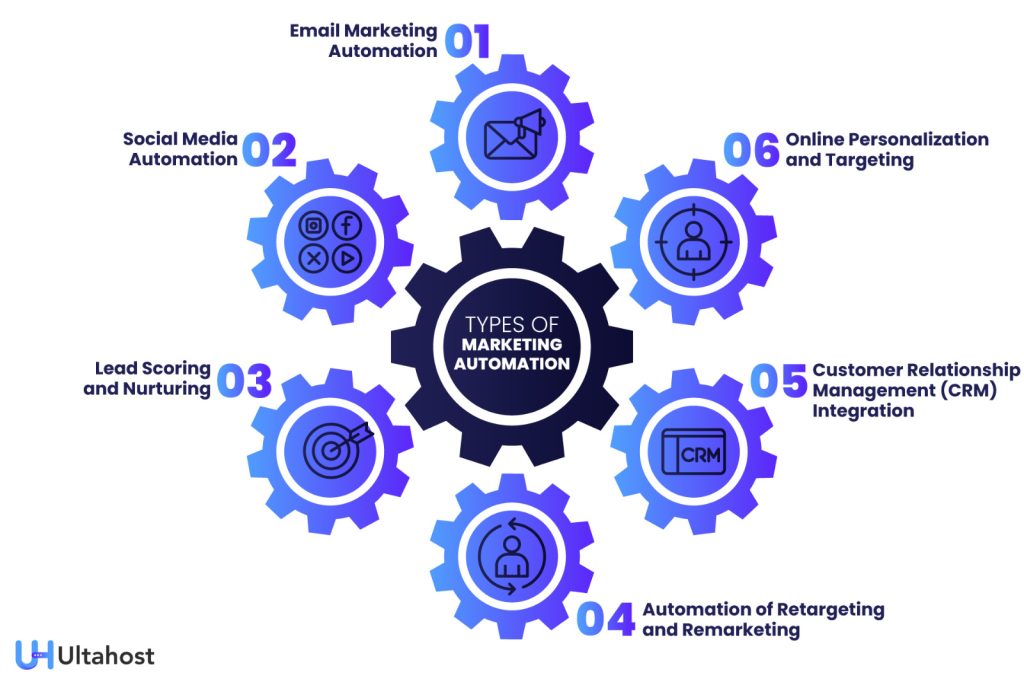
Email Marketing Automation
Lead nurturing is one of the key areas where automation is used in email marketing. It will send targeted emails based on user behavior and preferences. The automated campaigns can give welcome messages, follow-up emails, and personalized offers at the right time. These consistent communications keep leads active and move them through the sales funnel. Lead nurturing through relevant content increases conversion rates and develops business relationships.
Social media marketing automation makes managing social media accounts simpler. Marketers can prepare advance posts, which would allow a presence even at very inconvenient times to remain on the net. The feature has allowed making content in advance for the dates or campaigns. Apart from this, it will help manage comment and message responses so that you will reply to your followers in good time. Other analytical tools track the performances of these posts, and hence marketers would refine their strategy and try to improve the level of engagement.
Lead Scoring and Nurturing
Lead scoring is ranking based on the lead’s behavior and engagement levels. The marketing team scores leads based on activities such as website visits, email opens, and social media interactions. Through the score assigned to leads, one can prioritize sales efforts, as high-scoring leads embody high levels of interest in getting in touch with the organization. Such lead sourcing would therefore ensure that a business allocates its resources better with an increased conversion rate.
Customer Relationship Management (CRM) Integration
Integration with CRM with the help of a CRM hosting server to marketing automation tools is also there. Its integration helps in data management when it centralizes customer data. Marketers can see interactions and preferences on several channels in one place, and it also aids in targeting audiences better based on the information coming from the CRM. Marketers can make more personal campaigns and improve customer relationships by combining it with CRM.
Online Personalization and Targeting
Website personalization designs individual experiences of users by automating them based on their behavior. Marketing automation tools are used in analyzing user information for customizing content on websites, offers, and related recommendations. This form of personalization enhances engagement by giving every user relevant information. When the user gets information that is related to them, there is a high probability that they will convert. Targeting helps enhance user satisfaction and increase sales.
Automation of Retargeting and Remarketing
Automated retargeting and remarketing campaigns keep users who were previously engaged reconnecting with the businesses concerned. Automated campaigns could bring targeted ads across all major platforms to remind a user about a product or service again. This would remind consumers of the brand and the higher odds of returning to close their purchase. In such scenarios, businesses can augment the conversion and maximize their return on marketing investment with precise targeting of these warm leads.
Powerful Hosting for Social Network Growth!
For businesses looking to launch and scale their products successfully, UltaHost’s Social Network Hosting provides the reliable infrastructure needed to support high-traffic platforms, ensuring performance and scalability for your social networking.
Benefits of Marketing Automation
Marketing automation streamlines processes increases efficiency, and enhances customer engagement. It enables businesses to achieve better data management, improved ROI, and consistent messaging across all channels.
Improved Efficiency and Productivity
Marketing automation reduces manual work and saves time. The automation of repetitive tasks such as sending emails and posting on social media allows teams to focus on more strategic activities. Automation tools perform the same task consistently and accurately, with minimal human error. Businesses can, therefore, improve productivity and allocate resources to high-impact projects.
Enhanced Customer Engagement
This feature enables personalized marketing and precise messaging. Businesses can classify their audiences based on their behavior and preferences. Through segmentation, tailored communications with specific users are possible. Therefore, delivering relevant content at the right time helps to increase customer engagement and better connect with the audience.
Better Data Management and Insights
Marketing automation possesses robust analytics and reporting features for providing insights. These tools collect data from different channels of marketing and analyze the same. Marketers can track campaign performance, user behavior, and engagement metrics. The data-driven marketing approach helps businesses make informed decisions and improve their marketing strategies for better results.
Improved ROI
A good amount of research shows that marketing automation brings revenue increases. For example, if a company implements marketing automation, its revenue increases by 10% or more within six to nine months. Automation allows for improved b2b marketing since it streamlines processes and targets well. With improved targeting and streamlined processes, return on investment improves drastically since conversion rates rise when using automated campaigns.
Scalability of Marketing Efforts
Automation enables an organization to scale marketing efforts without proportionally scaling resources. As a business grows, automation provides the ability to handle larger-scale campaigns because management can manage large campaigns efficiently. With automation, it also means companies can reach more customers and engage with them better. Businesses can then expand marketing initiatives without a proportional increase in staffing or budgets by using automation.
Consistency in Marketing Campaigns
Brand integrity also relates to the same message across the board in terms of channels. Marketing automation will ensure consistency with the company voice and values for campaigns. Using automated tools, brand guidelines could be enforced, and the uniform approach maintained across the campaigns would automatically lead to trust and recognition in the minds of the consumers for higher brand loyalty and credibility.
Marketing Automation Tool Basic Features
Key features of marketing automation tools include segmentation, workflow automation, multi-channel management, and detailed analytics. These tools enhance efficiency, personalize customer interactions, and support data-driven marketing decisions.
User-Friendly Interface
The most important attribute of marketing automation tools is a friendly interface. This means that no marketer, regardless of expertise, faces any problem when using the application. Fewer complicated designs help the teams overcome the sharp learning curve, which enables the teams to prepare for automation. Moreover, a marketer can create and use content marketing automation tools, which is also another potential source of strength.
Segmentation and Targeting
Segmentation and targeting are two of the central features of marketing automation tools. They enable the distribution of an audience to discrete groups based on their characteristics, behavior, or tastes. This allows the preparation of targeted messaging to any segment, making the content much more relevant for receiving audiences. The resulting campaigns will be more effective; the customers will find much more value in engaging for conversion purposes.
Multiple Channel Campaign Management
Marketing automation allows one to manage multiple-channel campaigns from a single platform. Marketers can thus orchestrate efforts across email, social media, and websites using eCommerce hosting servers without switching tools. It simplifies the process and ensures consistency in messaging across all channels. It also enables improved tracking of user interactions for more effective cross-channel strategies.
Analytics and Reporting
Analytics and reporting must be included in measuring campaign performance. Marketing automation will provide you with real-time data on engagement metrics, conversion rates, and effectiveness. These insights can help marketers adjust their strategies to improve for future campaigns. The businesses will be in a position to make informed decisions in terms of what works and what does not, improving the marketing.
Workflow Automation
The execution of routine activities becomes less cumbersome because of workflow automation. Marketers can simply design an automated workflow which is then going to activate some other related action as a response to the user behavior. In this context, when the user has completed filling out the form, the system will automatically send a follow-up email. In this way, the time and labor spent in completing the same activity would decrease, which further saves more time in providing a timely response and ensures an improved experience for the customer.
Integration with Other Tools
One of the most prominent features of marketing automation software is integration with other business tools. It enables seamless communication between marketing, sales, and customer support systems. When these tools are connected, businesses can have a unified view of customer interactions and data. Integration increases collaboration and enables teams to work more effectively toward common goals, improving overall performance.
Additionally, integrating e-commerce apps with marketing automation can amplify product engagement. For example, platforms like Spark Shipping revolutionize dropshipping by offering full product data integration and automated order processing. These aspects enhance operational efficiency and synchronize inventory better, which could be crucial in managing large volumes across multiple supply chains. Marketing efforts thus seamlessly combine with the drop-shipping processes for maximum efficacy.
Advanced Features of Marketing Automation
Advanced features in marketing automation leverage AI, predictive analytics, and multivariate testing to enhance targeting precision and engagement. These tools help marketers forecast trends, prioritize leads, and deliver personalized content efficiently.

Predictive Analytics for Forecasting
Predictive analytics uses past data and algorithms to predict what the customer will do. It will analyze the pattern of past engagement and interaction that can give predictive models insight into identifying which clients are likely to convert or have a favorable response to the marketing activity. This enables marketers to make the best-informed decisions, which in this case allows marketers to foretell trends and position the campaigns accordingly about the expected behavior of customers.
AI-Powered Lead Scoring
Lead scoring done by AI, will estimate the conversion possibility of every lead and score it against the best sales prospectors. The scoring will give the leads the ranking so that the leads can get the highest ranked and prioritize them for sales. Different ways may be used by a scoring model to score a lead and these include its history of engagement, demographics, or behavior on digital channels. With time, machine learning improves this scoring because they begin to know the features linked with higher chances of converting. This approach based on data helps marketing and sales teams tailor efforts to leads that are more likely to generate revenue. Over time, this leads to greater sales efficiency and effectiveness.
Smart Content Suggestions
Smart content suggestions allow marketers to personalize different pieces of content with an individual based on what content the individual previously has reacted to and prefers. Machines will track everything an individual clicks on – that maybe specific topics, a set of products, or more content – then present content through the next set of machines, and then in any interaction, create this perfect sense of knowing about people and thus higher engagement with products. Smart content suggestions deliver the same consistent personal touch, whether they click links in emails, follow the contents on social media, or navigate through websites.
Advanced Multivariate Testing
Advanced multivariate testing allows marketers to test multiple campaign elements simultaneously to find the best-performing combinations. Unlike simple A/B testing, which tests two variations, multivariate testing examines multiple variables, such as subject lines, images, and calls-to-action. Automation tools then determine which combinations produce the highest engagement or conversions, optimizing campaigns for effectiveness. This detailed testing approach provides deep insights into what resonates with audiences, enabling marketers to refine their strategies with precision and data-backed insights.
Implementation Best Practices
Implementation of best practices for marketing automation involves setting clear goals, selecting suitable tools, and planning effective integrations. Continuous testing and a structured onboarding process further ensure long-term success and adaptability.
Clear Goals for Automation
Clear, measurable objectives need to be set before marketing automation. Examples of goals may include improved lead generation, improvement in customer engagement, and better conversion rates. Clear objectives guide the setup and customization of automation workflows to align with your business priorities. In addition, defined goals provide results easier to track since strategies can be tweaked and non-related activities, which aren’t part of the desired output, are avoided.
Selecting the Right Tool for Your Needs
There are some best free drawing tools. Select the right tool for your work.
It would depend on several factors: budget, functionality, and scalability. Start with the specific needs of your business, whether it be email automation, CRM integration, or advanced analytics. Then you’ll evaluate a potential platform against these criteria, such as ease of use, customer support, and compatibility with existing systems. If a tool matches well with the goals and resources, the process of implementing the tool would become easier, and the effectiveness of the tool would increase.
Planning an Integration Strategy
An integration strategy ensures marketing automation will work in sync with all your CRM, sales, and other key systems. Establishing an integration roadmap prevents one from having a data-silo situation and ensuring a good flow of information between multiple platforms. Good integration brings teams together easily for communication about customer information to attain a single customer view over interactions. Better coordination takes place between marketing and the sales team by increasing the chances of better campaign delivery for a better customer experience.
Creating a Step-by-Step Onboarding Process
A well-designed onboarding process is what ensures that your team is armed with the knowledge of how to use the automation tools effectively. Start your training on broad general features of the tool, and then plunge into more complex functionalities. Provide hands-on experience through guided exercises, so the team becomes confident with the software. An organized onboarding process builds up confidence, reduces user error, and accelerates the adoption of automation practices in your team.
Continuous Testing and Optimization
Continuous testing and optimization are important to hone automated campaigns and get to the best output. Check performance data for improvement, run A/B testing or multivariate tests, comparing elements in the campaign. Then make data-driven adjustments, which will keep campaigns fresh and effective. What’s more, continuous optimization won’t just boost engagement but also help ensure the maximum return on investment by making sure every detail of your campaigns is aligned with the changes in customer needs and market trends.
Take Your Marketing Automation to the Next Level!
Is your website ready to handle increased traffic from your marketing campaigns? With UltaHost’s E-commerce Hosting, you can ensure your site runs smoothly and securely while managing high traffic.
Challenges and Considerations
Challenges and considerations in marketing automation include managing data privacy and compliance with regulations like GDPR. Additionally, budgeting for tools and avoiding a “set it and forget it” mindset are crucial for long-term success.
Data Privacy and Compliance Management
Data protection laws apply in marketing automation. With the General Data Protection Regulation (GDPR), one has business regulation that binds them to be responsible as they care about customers’ information. Business organizations will have to ascertain whether it has acquired lawfully gathered, kept, and utilized particular private data concerning an individual. The implication would, therefore involve proper consent as users may grant or not accept particular private data which, in return, gives users choices as well on what kind of communications they accept. It is likely associated with a fee and wiping out the once-strong reputation of your brand.
Cost of Automation
Costing for marketing automation tools is not only a matter of the subscription fee at the outset. Business needs to factor in integration, training, and support costs. It is very important to determine the total cost of ownership, especially when there are hidden fees that come with advanced features or upgrades. Companies have to determine the ROI of automation tools to ensure they are in line with marketing budgets and overall business goals. The right financial plan will spend prudently and enhance the return on automation investment.
Avoiding the “Set It and Forget It” Mindset
One of the common marketing automation mistakes is believing it to be a “set and forget” tool. In reality, automation does indeed eliminate repetitive tasks but should still be monitored and optimized as campaigns are run. A regular analysis of performance metrics helps marketers understand which practices work and which ones don’t. Based on this information gathered from data, strategies must then be adjusted to keep the campaigns running appropriately. Thus, it maximizes the effects that automation can bring for better business responsiveness to changing market trends and customer preferences.
Future Trends in Marketing Automation
Future trends in marketing automation include the integration of AI and machine learning for smarter, data-driven strategies. Additionally, the rise of conversational marketing, hyper-personalization, and omnichannel engagement will redefine customer interactions and enhance overall marketing effectiveness.
AI and Machine Learning in Advanced Automation
The whole marketing automation landscape is changing with AI and machine learning. These technologies enable the platform to analyze massive data sets and learn from the user’s interactions. With this, businesses can now build more targeted and effective campaigns. AI enhances predictive analytics, which helps marketers understand the behavior of their customers and strategize in the best possible way. The whole evolution leads to smarter automation that continually improves on insights and performance metrics.
Increased Adoption of Conversational Marketing
There will be increased adoption of conversational marketing as automation has empowered chatbots and customer interactions in real-time. Businesses are using chatbots to instantly engage with the customers, answer questions that may be asked, or even walk them through sales. The tools are giving customers a more interactive feel, so they are not just being heard but felt as well. Automation lets brands keep a constant, conversational tone while staying on top of things that are timely, thereby resulting in increased customer satisfaction and better conversion rates.
Automation in Hyper-Personalization
Marketing, therefore will require automation for the implementation of hyper-personalization. Data collected from very many sources will enable organizations to deliver very highly customised content and recommendations directly to individual users. The advantage is over simple or elementary segmentation since it cuts at peculiar preferences and behaviour. This is made even easier by automated tools where there is dynamic adaptation at every customer touchpoint. For businesses that get used to hyper-personalization will emerge as the best of the lot when competition takes the keen edge.
Voice and Visual Automation in Marketing
Automation strategies are evolving with newer technologies like voice commands and visual searches. Since everyone is using smart speakers and voice assistants to search, making content optimized for voice searching is an absolute necessity by marketers. In the same way, one can just use a picture to look for any product through the visual search technology, making it the ultimate shopping experience. These automation tools’ advancements will undoubtedly open a gateway for them to get used in many voice and visual platforms as they seek to connect with customers.
Automation for Omnichannel Marketing
Automation is something that is key to delivering consistent engagement across multiple channels of marketing. An omnichannel marketing approach ensures there is one experience for all customers regardless of the tool they are using. These automation tools allow marketers the ability to synchronize campaigns running on email, social, websites, and more through the customer’s interaction through the different channels. These interactions will help deliver timely and contextual messages to be able to personalize them when they occur. This provides a consistent brand recognition through the enhancement of customer connections, thereby driving long-term loyalty.
Key Metrics to Track in Marketing Automation
Here’s a list of few key metrics which youy need to track in marketing automation:
Engagement Metrics
- Click-Through Rates (CTR): Click-Through Rate means measuring the percentage of users who click on a link in your email or ad.
- Open Rates: Indicates how many recipients opened your email, reflecting the effectiveness of your subject lines.
Conversion and Lead Generation Metrics
- Conversion Rate: Track conversion rates to assess the percentage of users who complete desired actions, such as:
- Lead Generation: Measure the number of new leads generated through campaigns to evaluate the effectiveness of your marketing efforts.
Customer Retention and Loyalty Metrics
- Customer Lifetime Value (CLV): Estimates the total revenue a business can expect from a customer throughout their relationship.
- Retention Rate: Measures the percentage of customers who continue to engage with your brand over time.
Cost and ROI Metrics
- Cost Per Acquisition (CPA): Evaluate the cost associated with acquiring a new customer.
- Return on Investment (ROI): Compares the revenue generated from automation efforts against the costs incurred, providing insight into overall effectiveness.
Conclusion
Marketing automation streamlines processes enhances efficiency, and boosts customer engagement. Key takeaways include understanding its core principles, benefits, and types of automation tools available. Businesses can leverage these tools to improve ROI and track important metrics for success.
Looking ahead, advancements in AI and machine learning will further transform marketing automation. The rise of hyper-personalization and conversational marketing will create more meaningful customer interactions. Explore automation options that align with your business needs. Investing in the right tools can elevate your marketing strategy and drive growth.
Are you looking for a reliable email hosting solution for your marketing automation? Choose Ultahost’s affordable email hosting for maximum security, privacy, and deliverability. Avail the opportunity now!
FAQ
What is marketing automation?
Marketing automation uses software to streamline marketing tasks, helping businesses improve efficiency and personalize campaigns.
How does marketing automation work?
It collects customer data, allowing businesses to send targeted messages and track interactions automatically.
What are the benefits of marketing automation?
Key benefits include saving time, improving lead generation, personalizing experiences, and providing campaign analytics.
Who can use marketing automation?
Businesses of all sizes, especially e-commerce, B2B, and service-based companies, can benefit.
Can marketing automation help with lead generation?
Yes, it identifies and nurtures potential customers through personalized, timely outreach.
Can marketing automation be personalized?
Yes, most marketing automation platforms offer personalization options. You can tailor content, emails, and messaging based on customer data, behaviors, and preferences, creating a more engaging experience.
How can marketing automation impact my ROI?
By streamlining marketing processes, improving targeting, and increasing engagement, marketing automation can help increase conversions, customer retention, and overall ROI when used effectively.





